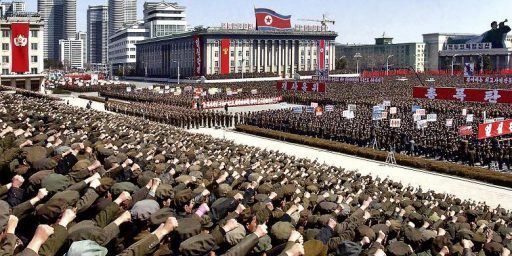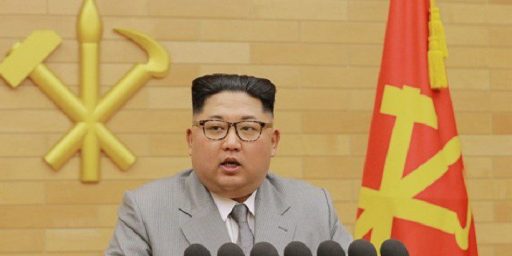AXIS OF EVIL: ACTUALLY EVIL
A couple of days ago, Meryl Yourish had an essay on attrocities in North Korea. Today, Rob Tagorda has a good post today on the brutality of that regime. He highlights Anne Applebaum’s column of today entitled, “Auschwitz Under Our Noses.”
Nowadays, it seems impossible to understand why so few people, at the time of the Auschwitz liberation, even knew that the camp existed. It seems even harder to explain why those who did know did nothing. In recent years a plethora of respectable institutions — the Vatican, the U.S. government, the international Jewish community, the Allied commanders — have all been accused of “allowing” the Holocaust to occur, through ignorance or ill will or fear, or simply because there were other priorities, such as fighting the war.
We shake our heads self-righteously, certain that if we’d been there, liberation would have come earlier — all the while failing to see that the present is no different. Quite a lot has changed in 60 years, but the ways in which information about crimes against humanity can simultaneously be “known” and not known hasn’t changed at all. Nor have other interests and other priorities ceased to distract people from the feelings of shame and guilt they would certainly feel, if only they focused on them.
Look, for example, at the international reaction to a documentary, aired last Sunday night on the BBC. It described atrocities committed in the concentration camps of contemporary North Korea, where, it was alleged, chemical weapons are tested on prisoners. Central to the film was the testimony of Kwon Hyuk, a former administrator at a North Korean camp. “I witnessed a whole family being tested on suffocating gas and dying in the gas chamber,” he said. “The parents, son and a daughter. The parents were vomiting and dying, but till the very last moment they tried to save the kids by doing mouth-to-mouth breathing.” The documentary also included testimony from a former prisoner, who says she saw 50 women die after being deliberately fed poison. And it included documents smuggled out of the country that seemed to sentence a prisoner to a camp “for the purpose of human experimentation.”
***
Later — in 10 years, or in 60 — it will surely turn out that quite a lot was known in 2004 about the camps of North Korea. It will turn out that information collected by various human rights groups, South Korean churches, oddball journalists and spies added up to a damning and largely accurate picture of an evil regime. It will also turn out that there were things that could have been done, approaches the South Korean government might have made, diplomatic channels the U.S. government might have opened, pressure the Chinese might have applied.
Historians in Asia, Europe and here will finger various institutions, just as we do now, and demand they justify their past actions. And no one will be able to understand how it was possible that we knew of the existence of the gas chambers but failed to act.
Rob also points to this Reuters piece:
Titled ‘‘Access to Evil,’’ the BBC-made show running Sunday night in its ‘‘This World’’ series features an official North Korean document that says political prisoners are used to test new chemical weapons. In a statement, the BBC said the documentary included comments by Kwon Hyuk, a new name given to a former military attaché at the North Korean Embassy in Beijing and chief of management at Prison Camp 22.
Using a drawing, he describes a gas chamber and the victims he says he saw at the prison in the northeast of the secretive Communist state, near the Russian border. ‘‘I witnessed a whole family being tested on suffocating gas and dying in the gas chamber,’’ he said.
‘‘The parents, son and a daughter. The parents were vomiting and dying, but till the very last moment they tried to save kids by doing mouth-to-mouth breathing.’’ ‘‘Normally, a family sticks together’’ in the gas chamber, he said. ‘‘Individual prisoners stand separately around the corners. Scientists observe the entire process from above, through the glass.’’ Asked how he felt about the children, he said: ‘‘It would be a total lie for me to say I felt sympathetic about the children dying such a painful death. Under the society and the regime I was in at the time, I only felt that they were the enemies. So I felt no sympathy or pity for them at all.’’
Meryl argues today–without reference to the Korea issue–that the Holocaust was “morally unique” because of the vastness of scale–and because of the intent to wipe out an entire ethnic-cultural-religious group– so she’d likely take issue with Applebaum’s evoking comparison in her piece. I don’t disagree that the slaughter of millions is worse than the slaughter of thousands. But one wonders at what point mass brutality becomes actionable. Clearly, a lot of factors are weighed. Numbers are part of the issue. Apparently, ethnicity is another (murder of Europeans in the Balkans is more noteworthy than Africans in Rwanda), as is economics, geography, and geo-politics.






Sir,
Very interesting article…one that had ashamned to be a human by its end. The last part of your commentary I feel neglects one major factor: the CNN effect. How long did we watch Christina Annapour talk about the poor Muslims in Bosnia? How much did Americans see the poor starving masses in Somalia? I haven’t seen the gulags mentioned in North Korea on CNN. Checnya is another case where from all indicators massive violations of human rights are being inflicted but the lack of press coverage is striking.
Additionally, North Korea is a special case due to the presence of Seoul so close to the borders and once a regime has nukes than the ability to intervene is even further restricted.
—